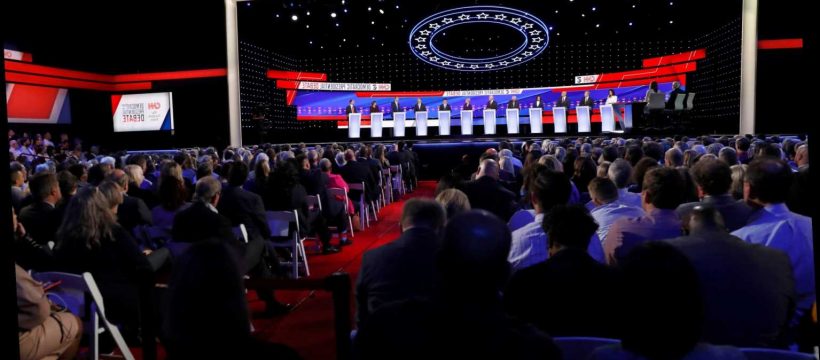The last debate of the year comes just 24 hours after the House of Representatives voted to impeach President Donald Trump – an issue likely to be front-and-center on the stage.
Seven Democratic presidential candidates will face off in the fifth debate of the 2020 cycle, starting tonight at 8 p.m. EST, as the calendar inches closer to the first-in-the-nation Iowa caucuses. The candidates who will debate tonight at Loyola Marymount University in Los Angeles, from left to right on stage, are:
- Entrepreneur Andrew Yang
- South Bend, Indiana, Mayor Pete Buttigieg
- Sen. Elizabeth Warren of Massachusetts
- Former Vice President Joe Biden
- Sen. Bernie Sanders of Vermont
- Sen. Amy Klobuchar of Minnesota
- Entrepreneur Tom Steyer
Impeachment wasn’t the only hot-button issue leading up to this debate. All seven candidates threatened to boycott if a union contract dispute with the university’s subcontracted food service workers went unsettled.
The dispute was settled Tuesday.
Reporters Katie Akin, Nick Coltrain, Kim Norvell and Robin Opsahl from the Des Moines Register, part of the USA TODAY Network, will be updating this article live throughout the night.
Candidates sign letter to DNC about qualifying standards
All seven qualifying candidates have signed a letter from Sen. Cory Booker to the Democratic National Committee asking to change its debate qualification standards for the January and February debates. Former Housing and Urban Development Secretary Julián Castro, who did not qualify for the debate, also signed the letter.
The letter argues the more stringent qualifying standards have pushed out the field’s diverse candidates. Yang is the only person of color on tonight’s debate stage.
Neither Booker of New Jersey nor Rep. Tulsi Gabbard of Hawaii qualified for this debate, two candidates who appeared on stage just a month ago. Sen. Kamala Harris of California qualified for the debate but dropped out earlier this month.
The DNC has raised it polling and fundraising thresholds with each debate. To qualify for tonight, candidates must have received 4% or more support in at least four national or early voting state polls, as well as hit 6% support in two single-state polls. Candidates also had to get at least 200,000 unique donors, with a minimum of 800 unique donors per state in at least 20 U.S. states.
— Kim Norvell
Source: Read Full Article
